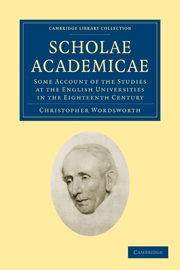 Scholae Academicae
Scholae Academicae Published online by Cambridge University Press: 07 September 2010
“Terrible apprehensions and answerable unto their names, are raised of Fayrie stones, and Elves spurs, found commonly with us in Stone, Chalk and Marl-pits.”
T. Browne, Vulgar Errors, ii. 5.Although some of the chief men who were interested in mineralogy and geology in the last century got their degrees elsewhere, we find that both at Oxford and at Cambridge the study of stones was not a novelty. Two keepers of the Ashmolean, Ro. Plott (Magd. H.) and E. Llwyd (Jes.) established the credit of Oxford in the 17th century. The latter edited a catalogue of english fossils in the Ashmolean Museum, under the title of Lithophylacii Britannici Iconographia (8vo. Lond. 1699; ed. 2. Oxon. 1760). Llwyd's book has been useful ever since, especially for the figures.
‘A Lapidary or the history of Pretious Stones by T. Nichols sometimes of Jesus-Colledge in Cambridge,’ printed by T. Buck, 4to. Camb. 1652, was founded chiefly upon the Gemmarum Historia of Anselm Boetius de Boot. The classification of stones by sizes tells of diligence and system at Cambridge, if the science was but infantile.
To save this book to your Kindle, first ensure [email protected] is added to your Approved Personal Document E-mail List under your Personal Document Settings on the Manage Your Content and Devices page of your Amazon account. Then enter the ‘name’ part of your Kindle email address below. Find out more about saving to your Kindle.
Note you can select to save to either the @free.kindle.com or @kindle.com variations. ‘@free.kindle.com’ emails are free but can only be saved to your device when it is connected to wi-fi. ‘@kindle.com’ emails can be delivered even when you are not connected to wi-fi, but note that service fees apply.
Find out more about the Kindle Personal Document Service.
To save content items to your account, please confirm that you agree to abide by our usage policies. If this is the first time you use this feature, you will be asked to authorise Cambridge Core to connect with your account. Find out more about saving content to Dropbox.
To save content items to your account, please confirm that you agree to abide by our usage policies. If this is the first time you use this feature, you will be asked to authorise Cambridge Core to connect with your account. Find out more about saving content to Google Drive.